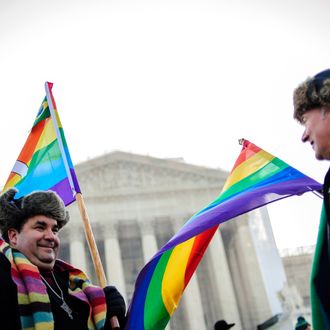
Just like after yesterday’s Prop 8 case, Supreme Court forecasters wasted no time after the oral arguments on the Defense of Marriage Act today to start predicting how the justices will rule. Without bothering to digest what they saw and with no decision expected until June, court reporters are still close to a consensus that it doesn’t look good for the constitutionality of DOMA, which gives federal benefits only to straight couples. That was the case before the oral arguments, which typically matter very little anyway, and nothing that happened over the course of the two hours inside did much to alter those expectations.
The notoriously audacious SCOTUSblog started off slow:
But came out pretty confident:
According to the New York Times, Kennedy, “widely considered the swing vote on the divided court, joined the four liberals in posing skeptical questions to a lawyer defending the law.”
“DOMA is in trouble,” said Jeffrey Toobin on CNN.
The best hope for traditional marriage seems to be the long shot that the court would decide it doesn’t have jurisdiction. From The Wall Street Journal’s live analysis:
As the procedural portion of the day’s arguments wound down, it wasn’t completely clear that the court believed it was free and clear to rule on the merits of DOMA’s constitutionality. The reservations the justices expressed during Wednesday’s proceedings stood in contrast to last year’s health-care arguments, where the court sent clear signals early on that it would decide the constitutionality of the health law.
But beyond that, gay rights in the nine states that allow same-sex marriage is heavily favored:
Lawyer Paul Clement, representing the House, opened the main portion of the morning’s arguments that examined DOMA’s constitutionality. He faced several tough questions from the court’s liberal wing—and from moderate conservative Justice Anthony Kennedy—that asked why the federal government had the right to define marriage, given that the issue was one traditionally reserved for the states.
Via Bloomberg:
During initial arguments today on the 1996 Defense of Marriage Act, Justice Anthony Kennedy suggested that a federal law that doesn’t recognize gay marriages that are legal in some states can create conflicts.
“You are at real risk of running in conflict” with the “essence” of state powers, Kennedy said. Still, he also said there was “quite a bit” to the argument by backers of the law that the federal government at times needs to use its own definition of marriage, such as in income tax cases.
Justice Ruth Bader Ginsburg said that when a marriage under state law isn’t recognized by the federal government, “One might well ask, what kind of marriage is this?”
Reuters put it delicately, but the point stands:
Justice Ruth Bader Ginsburg, referring to the separate and unequal divisions required by DOMA, was more plain: “There are two kinds of marriage,” she said. “Full marriage and the skim-milk marriage.”





























